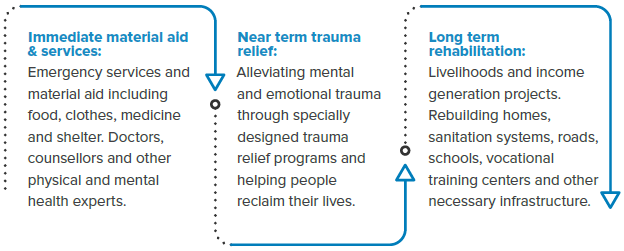
GUIDESTAR
Platinum Seal of Transparency

Platinum Seal of Transparency
Disasters, whether of natural origin such as earthquakes and floods, created by humans such as war, or due to a pandemic – has a profound psychological impact on people and communities globally. The stigma around seeking help for mental health precludes healing from the disaster at many levels. As important as rebuilding infrastructure after a disaster, is healing the hearts and minds of people who have been affected.
‘We have no control over disasters. That’s what’s scary about it. That feeling of helplessness is very scary’
Poor and vulnerable populations bear the brunt of disasters, suffering five times more deaths from disasters. During disasters, people living in poverty tend to look for ways to maintain their well-being by depleting household assets or borrowings, increasing family labor supply, cutting food consumption and reducing investment in health and education, which in the long term can lead to inter-generational poverty.
And now with the COVID-19 pandemic, we are facing the worst human and economic crisis of our lifetime, threatening lives and livelihoods and making the achievement of the SDGs even more challenging. This time, it is not just poor and vulnerable populations that are impacted. It is people, everywhere.
The COVID-19 pandemic: The impact of the pandemic on mental health is being felt more now than ever before. People are afraid of the virus, of dying, or of loved ones contracting the disease. They also worry about being quarantined, maintaining physical distancing, being isolated, and breaking constantly changing rules. These fears are only compounded by daunting apprehensions about their livelihoods.
Climate Change: In the 1900s natural disasters affected a million people in India . Thanks to climate change, they now affect 596 million people, that’s close to half the population in the country. Floods, storms and droughts are increasingly affecting lives, livelihoods and deeply impacting both physical and mental health of victims.
Terror attacks and crimes: According to the World Terrorism Index 2019, India ranks 7th amongst countries affected by terrorist attacks. Terrorist attacks cause wide-spread psychological impact, resulting in trauma and stress reactions for a long time after the incident.
We build individuals to respond to crisis: Our resilience-building programs train our volunteers to respond immediately to natural or man-made disasters, often reaching victims before other relief operations.
We provided integrated services: Our networks are vast and wide and include specialists from all sectors. When a disaster takes place, we are able to evaluate priorities and provide appropriate relief measures for rehabilitation of disaster victims.
We stay to the end: Our volunteers belong to the land and long after organized relief agencies leave the disaster zones, we continue to provide trauma relief to victims and long-term mental health support to residents impacted by the disasters.
We help disaster victims to help themselves: Through our programs, we empower disaster victims to build resilience and then help them rebuild their lives till they are ready to be integrated back into the mainstream.

Copyright © 2021. All rights reserved.